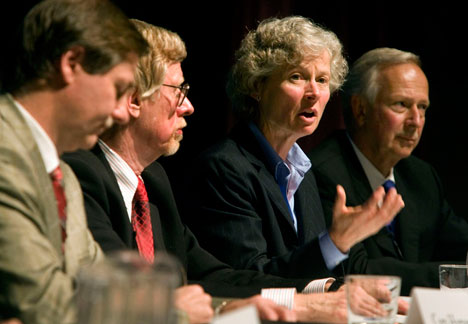
Large audiences packed Griffith Theater and the lower level of Page Auditorium Wednesday afternoon to hear five faculty experts discuss the crisis that has swept across Wall Street and world financial markets.
"I don't think there have been quite such turbulent times in my lifetime," President Richard H. Brodhead said in introducing the program, which he moderated. "If you're a student and you're wondering where you might work next year, that picture has probably grown somewhat more uncertain."
Students typed on their laptops and local television filmed from the back of Griffith as the panelists spoke at the first President's Forum on Critical Issues. Griffith filled up 10 minutes before the session started, with later attendees watching on a screen in nearby Page Auditorium.
Brian Duffy, a junior from Pennsylvania, said he came with classmates to learn about an economic situation he described as "crazy. It's really caught my attention. It's been fun to watch what's been happening every day. It's not a good thing, but it really is interesting."
Varun Gokarn, a senior from Connecticut planning to work at an investment bank after graduation, said he regarded recent events as "history in the making. I really don't know what to make of it."
The audience also included students from fields beyond economics, such as Jing Song, a graduate student in chemistry, who expressed curiosity about the financial crisis' "impact on chemistry and the rest of industry."
In their remarks, the panelists analyzed the situation's causes, potential solutions and likely effects on the upcoming election.
Cam Harvey of the Fuqua School of Business said a primary cause was "a gross failure of risk management at many different levels," adding that "it's no surprise to me that the American people are quite upset about this."
Although cautioning that smaller businesses will "starve" if liquidity is not restored soon to credit markets, he called for more comprehensive solutions than those contained in the proposed Congressional rescue plan. "I would lose no sleep if the bailout fails tonight," he said. "It is such a mess."
Coverage of the Financial Crisis in Duke Today
Cam Harvey: How did we get into this mess?
Steven Schwarcz on the treasury's bailout plan
Fuqua town hall on the financial crisis (video)
Commentary: Presidential candidates should make their treasury pick known
Law professor James Cox reviewed the origins of the crisis, describing how "the Fed did nothing" as a housing bubble developed several years ago. He said failures of the Securities and Exchange Commission, the rating agencies and others set the stage for the severe losses suffered by Lehman Brothers and other firms whose financial leverage was "pretty phenomenal."
Fuqua's Katherine Schipper, an expert on accounting, outlined four ways in which accounting problems contributed to the crisis, leaving investors and others without a clear picture of the risks they were taking. She argued against any suspension of fair-market accounting, saying valuations must be based on current financial realities rather than on the hopes of institutions waiting for bad loans to improve.
Craig Burnside, an economics professor, said policymakers need a clearer picture of whether the biggest threat now is that more financial institutions will go bankrupt because of bad loans or that money will freeze up within the financial system as a whole. They also need better assessments of how the crisis will affect the larger economy and the value of the dollar. "This certainly isn't going to make your European vacation cheaper anytime soon," Burnside said.
Political scientist David Rohde discussed the situation's impact on Washington, saying he could not remember when the president and leaders of both parties last recommended a piece of legislation only to see it defeated, as the House of Representatives did on Monday. He said that vote illustrated both Congressional concern about voter anger and the decline of White House influence as a lame-duck president ends his term in office. "This close to the end, it declines precipitously," he said.
Duke officials organized the program several days ago in response to the rapidly changing situation. In his opening remarks, Brodhead said the event illustrated the value to students and others of "being part of a community that can summon this kind of intelligence" to issues confronting society.
"I think it was fantastic," Provost Peter Lange said of the program, which he said "shows the enthusiasm of our students to learn more about the world. The panelists brought a great deal of clarity and, in some cases, new information. Personally, I came to understand some of the issues far more clearly and sharply than I had previously."
The program was "particularly valuable for students," agreed economics professor Gianni Toniolo. "It was a little technical at points, but overall it was excellent. The turnout was great and it absolutely was a good thing for Duke to do."